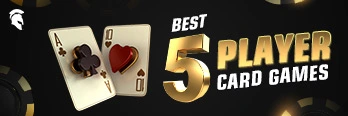Poker and blackjack are two of the most popular card games in casinos worldwide, each offering unique strategies, gameplay, and experiences. While both games involve skill and luck, they differ significantly in their rules, objectives, and player interactions.
This article will explore the primary differences between poker and blackjack, helping you understand each game better and choose the one that suits your style and preferences.
Game Objective
Poker
In poker, the primary objective is to win chips or money by either having the best hand at showdown or by forcing your opponents to fold.
Poker is a game of skill, strategy, and psychology, where players compete against each other rather than against the house. The most popular variant, Texas Hold'em, involves players making the best five-card hand from their two private cards and five community cards.
Blackjack
Blackjack, on the other hand, is played against the dealer, with the objective being to have a hand value closer to 21 than the dealer's hand without exceeding 21.
It is primarily a game of mathematics and probability, where players aim to make optimal decisions based on the cards dealt to them and the dealer's visible card.
Gameplay and Rules
Poker
Poker has numerous variations, with Texas Hold'em being the most widely played. In Texas Hold'em:
- Hole Cards and Community Cards: Each player is dealt two private cards (hole cards) and can use five community cards to make their best hand.
- Betting Rounds: There are four betting rounds - pre-flop, flop, turn, and river. Players can bet, check, raise, or fold during these rounds.
- Winning the Hand: The player with the best hand at showdown or the last player remaining after all others have folded wins the pot.
Other popular poker variants include Omaha, Seven-Card Stud, and Five-Card Draw, each with its own set of rules and strategies.
Blackjack
Blackjack has more straightforward rules:
- Card Values: Number cards are worth their face value, face cards (Jack, Queen, King) are worth 10, and Aces can be worth 1 or 11.
- Initial Deal: Each player is dealt two cards, and the dealer receives one face-up card and one face-down card.
- Player Decisions: Players can hit (take another card), stand (keep their current hand), double down (double their bet and take one more card), or split (if dealt a pair, split into two hands).
- Dealer Rules: The dealer must hit until their hand totals 17 or higher.
- Winning the Hand: A player wins if their hand value is closer to 21 than the dealer's hand without going over 21.
Skill vs. Luck
Poker
Poker is often described as a game of skill with elements of luck. Over the long term, skilled players consistently outperform less skilled ones by making better decisions based on probabilities, psychology, and game theory. Key skills in poker include:
- Hand Reading: Estimating the possible hands an opponent might have.
- Bluffing: Betting or raising to make opponents fold better hands.
- Positional Awareness: Using the position at the table to make strategic decisions.
- Bankroll Management: Managing your funds to withstand variance and maximize long-term profits.
Blackjack
While blackjack also involves skill, it is more heavily reliant on luck due to the random nature of card dealing. However, players can improve their odds by learning basic strategy, which involves making mathematically optimal decisions based on their hand and the dealer's upcard. Key skills in blackjack include:
- Card Counting: Keeping track of high and low cards to estimate the likelihood of favorable cards being dealt.
- Basic Strategy: Memorizing a set of rules for hitting, standing, doubling down, and splitting based on hand values and dealer upcard.
- Money Management: Setting betting limits and knowing when to walk away from the table.
Social Interaction
Poker
Poker is a highly social game, where player interaction and psychology play significant roles. Players need to read their opponents' behavior, detect bluffs, and make strategic decisions based on the actions of others at the table. The competitive nature of poker often leads to dynamic and engaging gameplay.
Blackjack
Blackjack is less social, as players primarily focus on their own hands and the dealer's upcard. While there can be some camaraderie among players, particularly when multiple players win against the dealer, the interaction is generally minimal compared to poker.
House Edge
Poker
In poker, players compete against each other rather than the house. The casino makes money by taking a small percentage of each pot (the rake) or charging a tournament entry fee. This means the house does not have a direct edge over the players, and skilled players can consistently make a profit.
Blackjack
Blackjack is played against the house, and the casino has a built-in edge due to the rules favoring the dealer. For example, players lose their bet if they bust, even if the dealer also busts. However, players can reduce the house edge to less than 1% by using basic strategy and card counting.
Variants and Formats
Poker
Poker offers a wide variety of game types and formats, including cash games, sit-and-go tournaments, and multi-table tournaments. Each format requires different strategies and skills, providing players with diverse and dynamic experiences. Some popular poker variants include:
- Texas Hold'em: The most widely played variant with two hole cards and five community cards.
- Omaha: Similar to Hold'em but with four hole cards and the requirement to use exactly two of them.
- Seven-Card Stud: Players receive seven cards, three face-down and four face-up, and must make the best five-card hand.
- Five-Card Draw: Each player is dealt five private cards and can exchange cards to make the best hand.
Blackjack
While blackjack also has several variants, the core gameplay remains consistent. Some common variations include:
- Spanish 21: Played with a deck that removes the 10s, offering different rules for doubling down and splitting.
- Blackjack Switch: Players are dealt two hands and can switch the top cards between them.
- Pontoon: A British variant with different rules for hitting, standing, and doubling down.
- Double Exposure: Both of the dealer's cards are dealt face-up, but the game has other rule changes to maintain the house edge.
Conclusion
Poker and blackjack each offer unique experiences and appeal to different types of players. Poker's emphasis on skill, strategy, and player interaction makes it a favorite among those who enjoy competitive and dynamic gameplay.
Blackjack, with its straightforward rules and focus on probability, attracts players looking for a game where skill can slightly offset the house edge.
Whether you prefer the strategic depth of poker or the mathematical precision of blackjack, both games provide exciting and rewarding experiences in the world of casino gaming.














